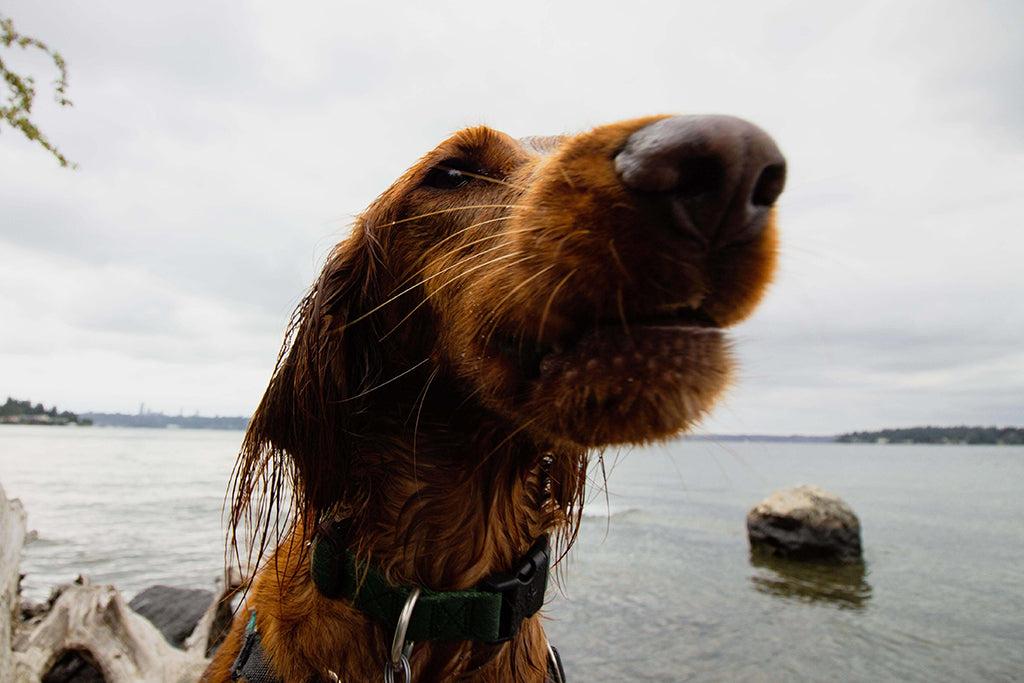“Do dogs have whiskers?” So, you may have noticed that your dog has whiskers! In this blog we learn what dog whiskers are for, if they fall out, whether you can trim them, if they’re sensitive and why they exist.
- Home/
- Dog/
- Health & Wellness/
- What Do Dog Whiskers Do?
What Do Dog Whiskers Do?

We know that dogs are covered in hair but did you know that dogs have whiskers!? We usually associate whiskers with our feline friends, but your dog actually has whiskers too! But, why? What’s the purpose of a dog’s whiskers…?
What Are Whiskers?
Whiskers on both cats, dogs, and other animals, are long, thick hairs that are located on the chin, above the eyebrows, and on their upper lip/muzzle. The exact positioning of whiskers varies from breed to breed, but what’s shared between all dogs is how sensitive they are…
The roots of a single whisker goes three times deeper than any other hair on their body! This is because the follicles they are connected to are surrounded by nerves and blood vessels; essential for their function. They’re quite wiry to touch and are naturally present on a dog at every stage of their life.
The Purpose Of Whiskers
Whiskers are primarily a sensory navigational tool, similar to insect antennae. They help your dog detect changes in the environment, movement, and sense objects. Their whiskers will tell them when spaces are too narrow to get through and whiskers can aid in detecting debris which can trigger the closing of the eyes and shaking of the body. Closing the eyelids protects the eyes from foreign bodies and a body shake helps rid them of unwanted and potentially irritable debris, dust, sand, and dirt.
Whiskers are also thought to play a part in communication (like their tail!). Some studies suggest that whiskers rise when a dog is happy and content and if they’re anxious or feel threatened, the whiskers may flare in the direction of the potential hazard.

You Should Not Cut A Dog’s Whiskers
Cutting, trimming, or plucking a dog’s whiskers can cause them to become very confused and is completely unnecessary. Plucking would cause pain for your dog too. It will leave them less able to sense the world and space around them, communicate and can also leave them vulnerable to eye injuries.
Cutting a dog’s whiskers is not an advisable thing to do as whiskers are a functional part of their body – they’re not just for aesthetic purposes. An owner would only be satisfying their vanity around the appearance of their pup if they choose to cut them; this choice would not be in the best interest of the dog.
If you have your pup groomed, your groomer may trim around the whiskers which is fine but they also should never mess with the length of your dog’s whiskers.
Do Dog Whiskers Fall Out?
It is common for the occasional and odd whicker to splinter or fall out completely. As long as it’s not triggered by human interference or disease, this is normally nothing to worry about. If it seems like a lot of whiskers falling out, contact your vet.
Do Dog Whiskers Grow Back?
If your dog’s whiskers have fallen out or they’ve been cut, yes, they should grow back. But remember, cutting them can cause your dog to become confused, so be patient with them whilst they grow back if this is the case. If you have any concerns about your dog’s whiskers, contact your vet.
Sources
Author Taffer, Marissa “Why Do Dogs Have Whiskers?” Sep 14. 2021, Dog-Eared https://blog.myollie.com/why-do-dogs-have-whiskers/
Authors Llera, Ryan BSc, DVM and Buzhardt, Lynn DVM “Why Do Dogs Have Whiskers?” VCA Hospitals https://vcahospitals.com/know-your-pet/why-do-dogs-have-whiskers
 S
S



